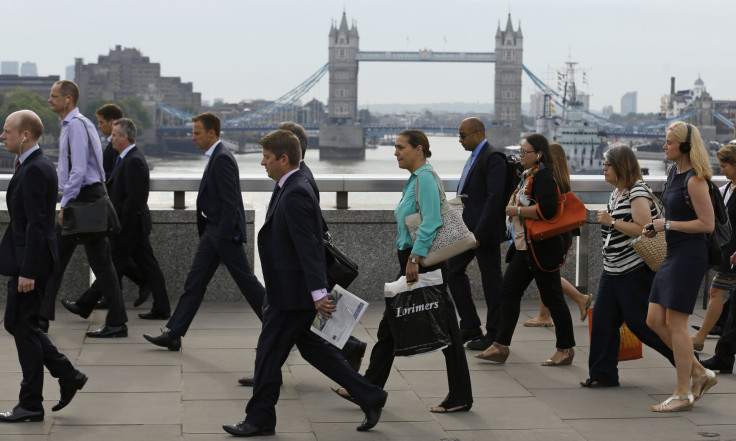UK's Rapid Economic Recovery Set For End-Of-Year Slowdown: Survey

(Reuters) - Britain's rapid economic recovery could slow markedly in the final months of 2014 after uncertainty about the global economy started to hit domestic businesses last month, a closely watched survey showed on Wednesday.
Services companies such as banks, hotels and hairdressers which make up the bulk of Britain's private sector saw growth slip to the lowest level since May 2013, according to the latest Markit/CIPS purchasing managers' index (PMI).
A broader measure which also includes data released earlier this week on manufacturers and construction firms sank to its lowest since June 2013, and sterling weakened to a one-year low against the U.S. dollar in response.
While Britain still looks set to outpace other advanced economies this year, the pace of the recovery has eased over the last few months as European demand fades.
The economy now looks on track to grow around 0.5 percent in the last three months of 2014 compared with 0.7 percent in the third quarter, according to data company Markit, which compiles the PMIs.
The prediction stands at the most pessimistic end of forecasts from economists polled by Reuters, and contrasts with the Bank of England's expectation for growth of 0.8 percent in the fourth quarter.
Members of the central bank's Monetary Policy Committee (MPC) meeting this week will pay close attention to the survey as they gauge when to start finally raising interest rates.
"With the MPC beginning its November meeting today, these results are likely to strengthen the conviction of the doves that this is no time to think about raising interest rates," said Martin Beck, economic advisor to consultancy EY ITEM Club.
The UK services PMI sank to a 17-month low of 56.2 in October from 58.7 in September, weaker than even the gloomiest forecast in a Reuters poll of analysts.
But the index remained above its historic average as well as the 50 threshold that marks growth, and bettered the PMIs for all other major European economies except Sweden.
Growth in Britain's services sector was tempered by a mix of worries about the euro zone, the risk of a sharp slowdown in China, uncertainty about U.S. monetary policy and geopolitical fears, according to Markit chief economist Chris Williamson.
NO PRESSURE TO HIKE
The BoE is already expected to keep interest rates at 0.5 percent after its monthly meeting ends on Thursday. Economists increasingly predict it will leave them on hold well into next year.
An absence of inflationary pressure in Wednesday's survey is likely to bolster that view.
Prices charged by services companies declined for the first time since May 2013, albeit only modestly, while growth of input prices eased.
Three of the BoE's most senior officials have signaled they are comfortable with record-low rates over the last few weeks. Minutes from the Bank's October policy meeting showed most officials were worried about the weak euro zone economy.
Markit's composite PMI, a broader gauge of the economy that combines services, manufacturing and construction industries, fell to 56.4 from 58.1 -- its lowest level since June 2013.
"The surveys therefore suggest that the Bank of England will wait to gauge the full extent of the slowdown before making any decisions on policy," said Markit's Williamson.
Earlier this week, PMIs showed Britain's construction sector expanded at the weakest rate in five months in October, while British manufacturing surged unexpectedly last month.
© Copyright IBTimes 2024. All rights reserved.











